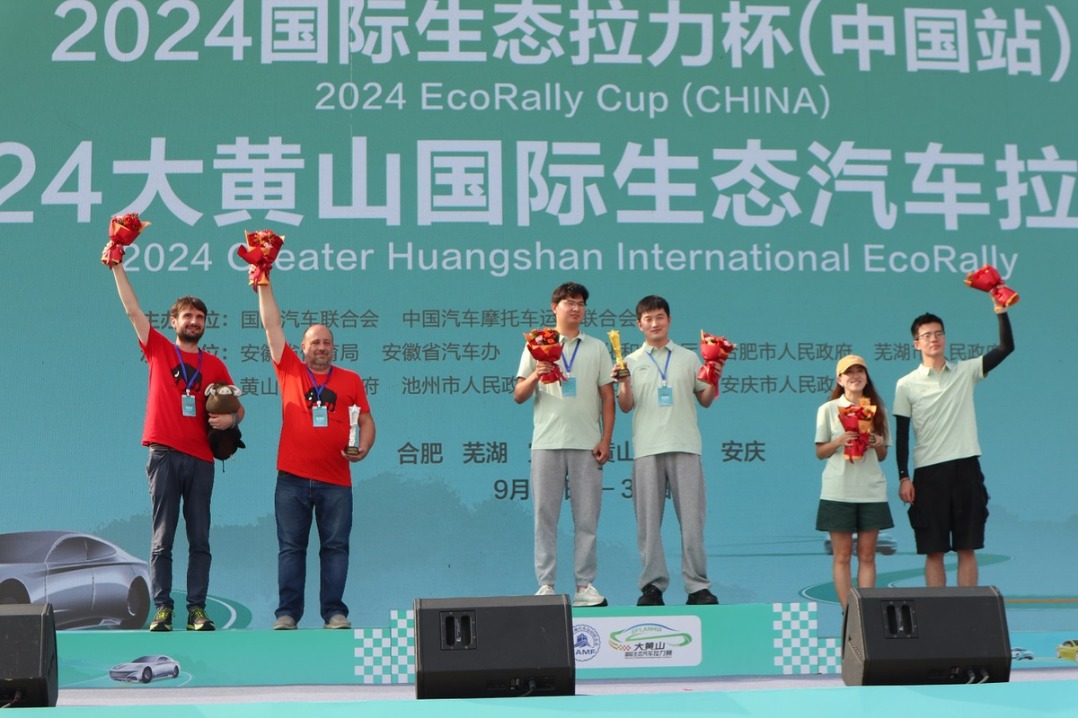Well served
Padel - a racket sport that combines elements of squash and tennis and demands less fitness of the player than either of the two - is gaining ground in Hong Kong. Faye Bradley reports.

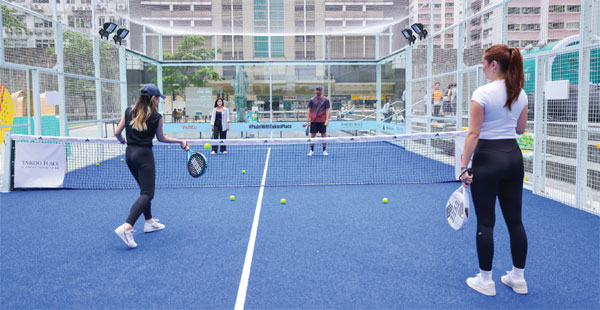
Padel - a racket sport that supposedly originated in Acapulco, Mexico in the '60s - was considered rather niche for a long time. According to an International Padel Federation (FIP) report published this year, more than 30 million people are playing the sport in 130 countries, up from more than 25 million players in 90 countries in 2023 - the year padel (pronounced "pah-del") was included in the European Games.
The sport is gaining traction in Hong Kong as well. Hong Kong players Aziz Khan and Vincent Chau are ranked 68th and 86th respectively on the Asia Pacific Padel Tour chart for male players, while Fiona Tsui is 63rd on the female chart. A seasoned tennis player, Khan first tried his hand at padel some years ago, at the Hong Kong Golf and Tennis Academy. Nowadays he is a regular at Padel+ Hong Kong - the city's first padel club - training diligently toward improving his game.
The club collaborated with Taikoo Place, an upmarket commercial complex in Quarry Bay, to launch Project After 6: Padel Tour 2024. The program, which ran from May through August, offered tailored coaching to those who visit the complex for work. Taikoo Place's general manager Winsze Chung says that the project is the outcome of "a desire to bring this exciting, emerging sport to Hong Kong's lively community and promote a more well-rounded lifestyle for the office-goers in the area".
Angela Cheng, a 43-year-old housewife who lives in the neighborhood, stumbled into her maiden padel experience on one of her walks through Taikoo Place. "My husband and I have walked past the court a few times. When I heard that they have professional coaches and it's free of charge, I immediately booked a slot," she says.
Cheng's on-the-spot decision to check out padel paid off: "It's fun! I really like it. It feels somewhat easier than tennis - a great mix between squash and tennis, I would say."
Yvonne Lau, a 31-year-old communications specialist who also tried her hand at padel at the Taikoo Place facility, is itching to give it another go. "It's a great initiative that's about giving back to the community, whilst encouraging people to do sports," she says.
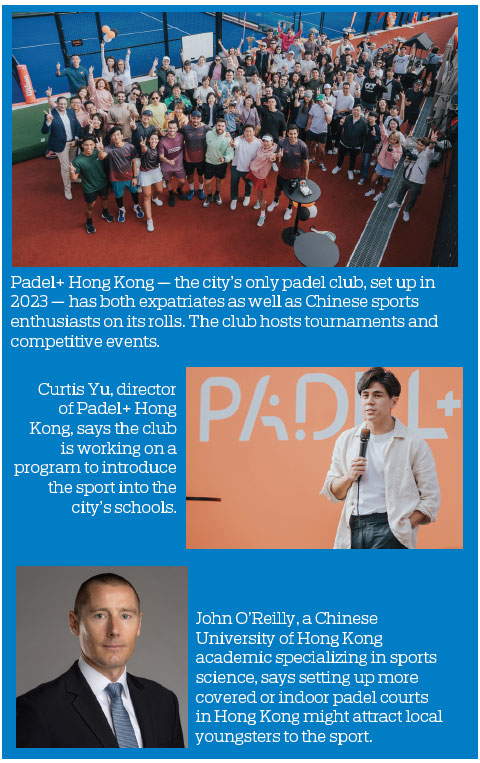
The story so far
"It was in Spain where the sport truly found its footing, becoming mainstream by the mid-2000s," says Mat Bonet, director of Padel AC, a Rotterdam-based sports agency for spotting and promoting padel talent. "Today, Spain is considered the global epicenter of padel, producing top trainers, players and training schools."
In Asia, Japan was one of padel's early adopters. The country's first padel club opened in Tokorozawa in 2013. Subsequently, the sport has found favor in Thailand, India, the Philippines, and now Hong Kong.
Padel is predominantly played as a doubles match and is fairly easy to learn, even if you have never played tennis. Smaller in size than a tennis court, a padel court is boxed in by glass or net walls on all sides. The scoring system is similar to that in tennis except that in padel, once the score is tied at deuce (40-40), the team that wins the next point wins the match.
"The secret to padel's meteoric rise lies in its accessibility," says Bonet. "Unlike many sports that demand years of practice to achieve proficiency, padel offers instant gratification. Novices find themselves able to rally, score points, and most importantly, have fun, beginning with their very first game."
Padel attracts both seasoned athletes as well as amateurs. Tennis legends such as Andy Murray, Serena Williams, Rafael Nadal and Novak Djokovic have tried their hand at padel. Relatively older people are sometimes drawn to the sport as it is played on a synthetic grass court enclosed by walls, thus minimizing the risk of injuries common in other racket sports. "It's not uncommon to see 60- or 70-year-old players on the court, holding their own against younger opponents, as experience often wins over physical power in padel," Bonet says.
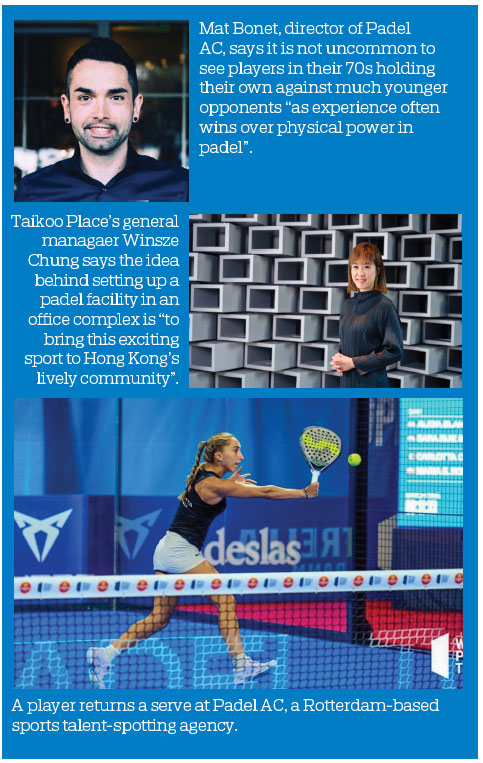
On home turf
Padel+ Hong Kong was started in 2023, with the aim of "creating a vibrant community around the sport," says the brand's director Curtis Yu. The club's Sai Kung venue attracts a mix of clients, in the age range of 20 to 50. Members include both men and women, and mixed-doubles matches are a common sight. Yu says that while the majority of the club's members are "expatriates from padel-familiar countries like Spain, Argentina and France", there is a growing interest from among the local Chinese communities as well.
Padel+ Hong Kong also hosts tournaments and competitive events. In April, the club held a Hong Kong Grand Slam for both professional and amateur players. "All these events came about as a result of the increasing demand from players to compete and see the results of the efforts they have been putting in during the training sessions," Yu says.
Khan, who is on the club's team of professional players, says while the similarities between tennis and padel have made his transition to the latter easier, "there are also differences and many things to learn, making it exciting to challenge myself in another sport." "I have been able to take part in some of the competitions in Asia this year and have found them enjoyable and challenging at the same time," he adds.
With the city's padel players making it to the global ranking charts, now might be a good time for the Culture, Sports and Tourism Bureau to look closely at the city's padel prospects. "Early adopters are finding themselves at the forefront of an exciting sports movement," says Bonet. He says he believes "a range of opportunities awaits those willing to embrace the roles of sport ambassadors".
The health benefits of playing the sport are all too obvious. "Padel focuses on various skills, such as hand-eye coordination, aerobic and anaerobic fitness, as well as building strengths in players," says John O'Reilly, a lecturer at the Chinese University of Hong Kong's Department of Sports Science and Physical Education.
"Beyond the recreational benefits, I believe padel can play a valuable role in enhancing community well-being," says Chung of Taikoo Place. "Padel is a combination of physical exercise and social engagement that allows players to stay active, relieve stress, and enjoy sports with their friends and teammates."
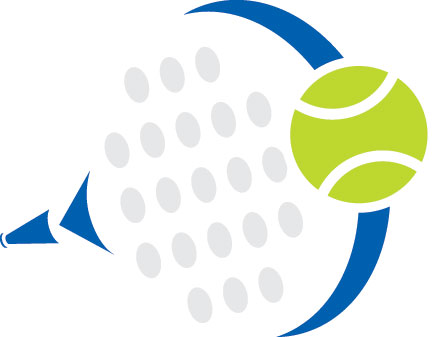
The road ahead
Hong Kong's unpredictable weather could be a disadvantage for those who like to play in outdoor courts. "The oppressive heat, humidity, as well as frequent rain and thunderstorms prevent people from getting regular practice," O'Reilly says. "If the government can help provide more accessible facilities, preferably covered or indoor courts, I think that would help promote the sport among local youngsters." He adds that setting up padel facilities in schools could encourage youngsters to get involved.
Yu says that Padel+ Hong Kong is developing a program to introduce the sport in the city's schools.
"The enthusiastic response to the padel tournament hosted by Taikoo Place for those who work in its buildings, as well as the success of the recent open tournament hosted by Padel+ Hong Kong, are clear indicators of the sport's growing popularity," says Chung. "As the sport continues to gain traction, we can expect the emergence of more leagues and tournaments, further cementing padel's status as a prominent part of the city's sports scene."
- International NEV rally concluded in Anhui
- Conservation at Sanjiangyuan: Protecting the roof of the world
- Inspirations for change: Inner Mongolia's green development
- British journalist witnesses commemoration of Confucius
- Feeding koi fish at Kong Family Mansion in Quzhou
- PLA conducts combat preparedness patrol in South China Sea
















